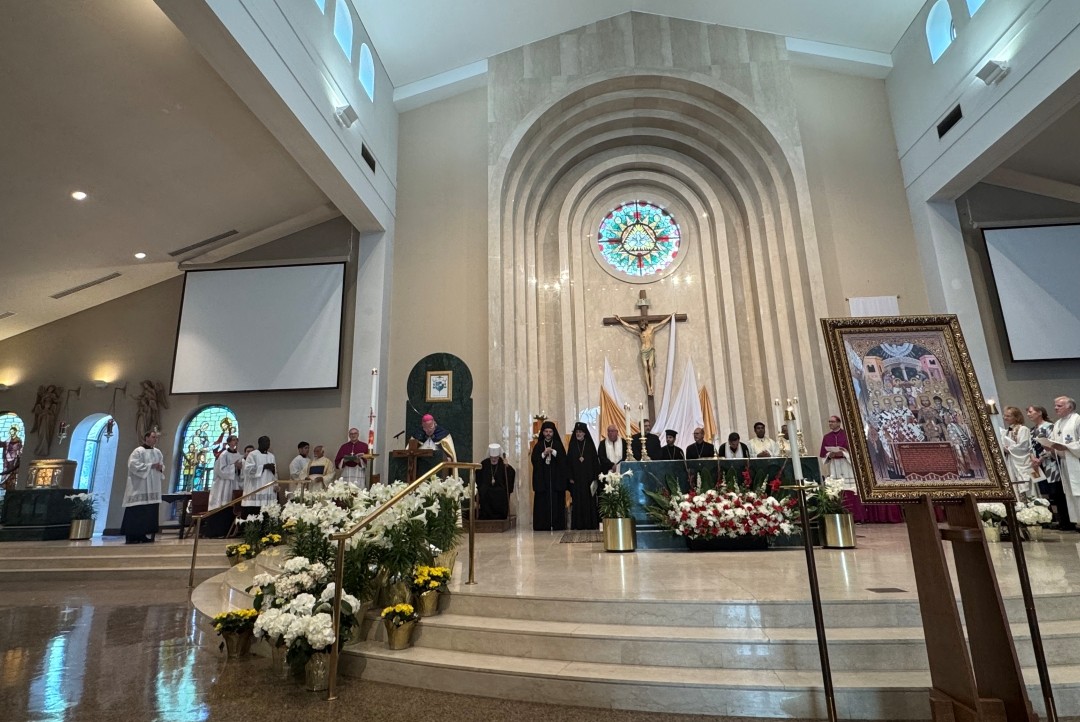Christians gather to mark Nicene Creed anniversary, pray for unity
Extending words of welcome to all who gathered for the statewide ecumenical prayer service commemorating the 1,700th anniversary of the First Council of Nicaea, Bishop David M. O’Connell, C.M., spoke of the joy and privilege it was to have people of varying Christian traditions come together “to commemorate, to reflect upon and to celebrate a key moment, an historic development in the Christian story – the Council of Nicaea and the formulation of the Creed that bears its name.”
“It’s my honor to welcome you, my brothers and sisters in Christ, all who are gathered here to mark this significant anniversary in the history of the Lord’s disciples and all that the Council of Nicaea and the Creed it composed means for us today,” Bishop O’Connell said, adding that he was also “particularly mindful of those Christians present who express their faith through other denominations in addition to those represented formally in the day’s program.”
“In the words of the Apostle Peter to his master and ours, ‘Lord, how good it is for us to be here,’” he said May 3 St. Robert Bellarmine Co-Cathedral, Freehold.
Bishop O’Connell served at the request of Cardinal Joseph W. Tobin, C.Ss.R., Archbishop of Newark, who, as a member of the College of Cardinals, was in Rome for the funeral Mass for Pope Francis and the conclave for the election of the new pope.
The theme of the service was “We Believe In One God,” reflecting Christian unity and the beginning of the Nicene Creed, the statement of faith that originated at the Council of Nicaea.
“This milestone invites us to not only look back at history but also to consider its relevance today, as communities continue to seek harmony and understanding in a diverse and interconnected world,” Bishop O’Connell said. “The Council of Nicaea stands as a testament to the pursuit of unity, even in the face of profound differences – a timeless lesson for believers and nonbelievers alike.”

Representatives of East and West
During the service, the congregants, including clerics and laity from Roman and Eastern Catholic traditions, Orthodox, Anglican, Lutheran, Presbyterian, Reform and Methodist churches, reflected on promulgation of the Nicene Creed in 325 A.D. by Christian leaders at the Council of Nicaea. Over the centuries, the different Christian traditions represented split over a variety of issues, leading to recent work to restore Christian unity.
Readings were proclaimed from St. Paul’s Letter to the Corinthians and St. John’s Gospel. The service included homilies by Auxiliary Bishop James Massa of Brooklyn and Metropolitan Antony of the Ukrainian Orthodox Church of the USA. Verse by verse, Greek Orthodox Metropolitan Apostolos of New Jersey led the Nicene Creed in its original Greek; then the congregation followed, reciting the same words, each in his or her own language of prayer.
Bishop Massa, former executive director of the U.S. Conference of Catholic Bishops’ Secretariat for Ecumenical and Interreligious Dialogue and a former consultor to the Pontifical Council for Interreligious Dialogue, urged those gathered to “listen to what the Spirit is saying to the churches of our times. Hear the summons to continue the noble work filling the Body of Christ and bringing its members to unity, a unity that is not uniformity, but witnessing to peace and justice in our fractured world and the caring of God’s creation. Let us listen humbly and eagerly and be ready always to be surprised, for the Spirit flows where he wills.”
“Only the Spirit can heal our wounds,” Bishop Massa said. “Only the Spirit can protect us from evil. Only the Spirit can arouse our hope in Jesus, our first love.”
He said churches hear the summons “to listen to the Spirit as we look both to the ancient past and to the road ahead for Christian unity.”
“Every ecumenical synod, every church assembly, across our confessional traditions, has invoked the Holy Spirit to guide the leadership in its decision making.”
The Creed as a call to love
In his homily, Metropolitan Antony urged the congregation to regard the Creed not as an ancient formula but as a call to sacrificial love, unity in truth and courageous witness to the modern world.
“On this day, the 1,700th anniversary, we do not simply recall a historical gathering, we have reawakened a profound vision of unity, truth and love that animated the fathers of that sacred council. The Nicene Creed, born of that council and completed 56 years later, is not merely a liturgical recitation,” he said, referring to the Eastern bishops’ Council of Constantinople in 381. “It is a theological proclamation, a baptismal confession and a moral compass. It not only affirms what we believe but how we are to live. The Creed is not a statement carved in a particular period of time, but a living memory and testimony inscribed in the hearts of all believers. It shapes our identity as Christians, of who we are.”
This article was written by Mary Stadnyk for Trenton Monitor.
Featured image: “We Believe in One God” prayer service. (Monitor photo by Marianne Hartman)


